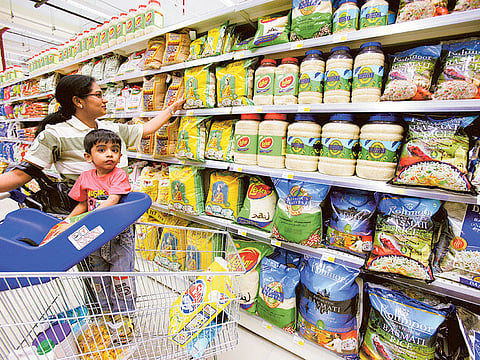Worries about food shortages in Gulf are misplaced
Authorities should take action and penalize any trader found making unjustified price hike

The Food and Agriculture Organization (FAO) issued an important report last week, reaffirming our previous conclusions about the abundance of foodstuff in global markets, including in the Gulf. It said that a sharp decline in food commodity prices was noticed in the past three months, by which prices of basic commodities, such as dairy products, meat, sugar, and vegetable oils, fell an average of 3.4 per cent in April compared to March.
According to the report, sugar experienced the biggest price decline - by 14.6 per cent - and this was attributed to the logistical and economic effect of the coronavirus pandemic. As early as the beginning of the crisis, foreign media and many social media users tried to stoke the panic that afflicted consumers and naively attempted to portray the situation in some of the Gulf countries as a food crisis waiting to happen.
Yet, the facts were soon revealed and things got back to normal as soon as panic buying vanished, with citizens securing their needs easily and seamlessly. The problem with the ideologized and naive media is that it does not take into account technical progress and turn a blind eye to earlier reports issued by the United Nations.
Advances in farming and storage have led to a qualitative shift in the harvest of crops, which has become fully automated in major food-producing countries, including developing countries in Asia and Africa.
Consequently, the economic shutdown has not affected the volume of agricultural production, now that machines harvest products, assemble, clean, pack and prepare them for final consumption, while requiring very fewer workers.
Supply side
As for the logistical issues, they can be overcome by time, which is already happening. The Gulf countries despite the closure of land, air and maritime borders, are still open to trade and freight transport. What could affect production of some food commodities significantly is indeed climate change.
In the past month, for instance, unseasonal rains shortly before harvest devastated rice-growing regions in the Indian subcontinent. Despite such a decline in yield of these countries, the shortages created will be covered by other countries, such as Thailand, which is the largest exporter of rice in the world.
In fact, the major problem in the Gulf has nothing to do with shortage of foodstuff, as some demagogic media are trying to portray, but rather related to the consumption culture.
According to a reports issued by the Gulf Organization for Industrial Consulting (GOIC), the value of food imports to the GCC amounted to $29.17 billion in 2016, from $23.6 in 2014, a significant increase by any measure. The GOIC expects the value to rise sharply to $53.1 billion within the next four years.
This surge is not completely caused by to the increasing basic food requirements of the population. There is wastage ranging between 15-20 per cent related to consumption behaviors.
These can obviously lead to negative impact on the trade balance of these countries and family budgets, who can save 20 per cent of their spending on food purchases if they were careful with their wastage. This means that Dh200 can be saved for every Dh1,000 or riyals of food-related expenses.
Hence, the problem does not lie within the lack of food, but rather in wasteful consumption, as well as the exploitation by some suppliers, which led to doubling the prices of some commodities. They have taken advantage of the almost complete absence of monitoring by the ministries of trade and the economy, which must act and punish all suppliers who take advantage of these circumstances.
The bottom-line is that these dilemmas need to be sorted out to restore the consumption and price balance in the markets.
-- Mohammed Al Asoomi is a specialist on energy and Gulf economic affairs.
Sign up for the Daily Briefing
Get the latest news and updates straight to your inbox



